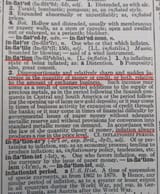>>514811300
>Both words and people have gender.
Nope. Language has gender. Gender is a construct of language. In Spanish, a heavily gendered language, the shirt is "la camisa". The "la" represent the feminine gender, but that does not mean every shirt is a girl, it's merely a construct of the language. Same with people. In Spanish, the child is "el nino". This does not mean that every child is male ("el" is masculine). It is simply a language construct.
The point is that language is the tool to convey our thoughts, but if our thoughts are not well-constructed, or if the language used to convey those thought is not well-constructed, the result is confusion.
A non-gendered example of mis-used langauge that creates confusion is the modern (bastardized) use of the word inflation. Nowadays people use inflation to means "prices go up", when in reality it is inflation that causes prices to go up (yes, other factors can cause prices to rise, such as shortages, shipping problems, etc., but none of these is inflation).
TL;DR If you want to speak clearly you must think clearly, and vice versa.
